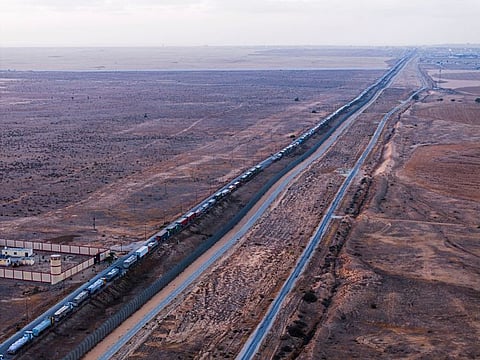Israel shuts Gaza crossing after Hamas rocket barrage from Rafah
Israel, Hamas trade blame for deadlocked talks on ceasefire

WASHINGTON: Israel closed the Kerem Shalom humanitarian crossing into Gaza on Sunday after a rocket barrage was fired by Hamas from the southern Gaza city of Rafah, in an incident that could imperil delicate hostage and ceasefire negotiations.
Israel and Hamas have been negotiating for weeks through mediators toward a potential truce that would include the release of hostages held in Gaza and of Palestinian prisoners held in Israel. At the same time, Israel has threatened to launch an operation in Rafah, where it says Hamas battalions remain intact, and where hundreds of thousands of Palestinian civilians are sheltering.
The Israeli army said about 10 projectiles were fired at Kerem Shalom, a corridor for humanitarian aid transfers that US Secretary of State Antony Blinken visited last week. Hamas’ military wing claimed responsibility for the attack, which Israel’s Foreign Ministry said in a social media post injured seven people.
The Israel Defence Forces didn’t immediately confirm the number of casualties, but said the launches took place “adjacent to the Rafah Crossing, located approximately 350 meters (0.2 miles) from civilian shelters.”
The attack came hours after Prime Minister Benjamin Netanyahu said Israel is prepared to temporarily halt the war in Gaza to gain the release of the hostages held there, but won’t agree to the Hamas demand to end the war completely. Israel’s defense minister warned that its forces continue to prepare for a potential assault on Rafah in southern Gaza.
Netanyahu doubled down on his position on Sunday.
“We are not ready to accept a situation in which the Hamas battalions come out of their bunkers, take control of Gaza again, rebuild their military infrastructure, and return to threatening the citizens of Israel in the surrounding settlements, in the cities of the south, in all parts of the country,” Netanyahu said in a statement on Sunday. Hamas, not Israel, is preventing a deal, he added.
Giving in to Hamas’ demands would be a “terrible defeat” for Israel, a huge victory for Hamas and Iran, and would project a “terrible weakness” to Israel’s friends and enemies alike, Netanyahu said, according to a statement released by his office.
This weakness would distance any further peace agreement, Netanyahu said, in an apparent reference to potential normalization of ties with Saudi Arabia.
“This weakness will only bring the next war closer, and it will push the next peace agreement further away,” Netanyahu said. “Alliances are not made with the weak and defeated, alliances are made with the strong and victorious.”
Hamas political chief Ismail Haniyeh said in a statement that the group, which is considered a terrorist organization by the US and European Union, brought “seriousness and positivity” to the current talks.
Netanyahu, he said, wanted to “invent constant justifications for the continuation of aggression, expanding the circle of conflict, and sabotaging efforts made through various mediators and parties.”
Hamas conducted a series of contacts with mediators and with resistance factions, and held intensive meetings and consultations before sending its delegation to Cairo, he said.
Hamas is still keen to reach a comprehensive agreement that guarantees the withdrawal of Israel forces and achieves a serious prisoners/hostage exchange deal, Haniyeh added.
In response, Israeli Defence Minister Yoav Gallant said he sees indications that Hamas doesn’t want a deal, which would open the door to “intense” military activity in Rafah.
“IDF forces are ready for a powerful operation all over Gaza and especially in the Rafah area,” he said in a post on X.



